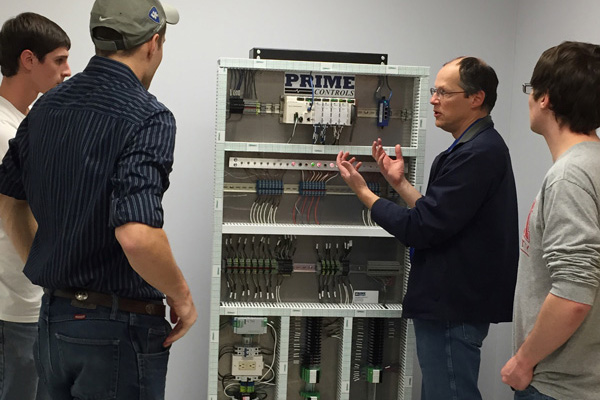Electrical Concentration
 Electrical engineering is one of the oldest and broadest areas of engineering. It encompasses power, electronics, controls, robotics, image processing,
telecommunications and much more. Consider a typical day, and then try to imagine what it would be like without the myriad contributions of electrical engineering.
From start to finish, your day would be almost unrecognizable without an alarm clock, a hot shower, breakfast cooked on your stove or in your microwave, your car, your
phone, your computer, lights, power — the list goes on. Even the clothes you wear and the food you buy would be vastly different if produced without the use of electricity and electrical machines.
Electrical engineering is one of the oldest and broadest areas of engineering. It encompasses power, electronics, controls, robotics, image processing,
telecommunications and much more. Consider a typical day, and then try to imagine what it would be like without the myriad contributions of electrical engineering.
From start to finish, your day would be almost unrecognizable without an alarm clock, a hot shower, breakfast cooked on your stove or in your microwave, your car, your
phone, your computer, lights, power — the list goes on. Even the clothes you wear and the food you buy would be vastly different if produced without the use of electricity and electrical machines.
Engineers who work in this area may work on very large things, such as high-voltage transformers, or microscopic things, like nanoelectronics. Engineers bridge the gap between science and the real world, turning ideas into reality. As an electrical engineer, you can apply knowledge to improve lives in tangible, meaningful ways - from image-guided surgery to innovative lighting techniques for developing countries to faster microchips.
Curriculum
Engineering Major Core Courses
- Introduction to Engineering Design and Analysis
- Solid Modeling
- Introduction to Matlab and Computer Programming
- Survey of Computational Engineering
- Materials Engineering
- Mechanical Engineering Fundamentals I: Mechanics
- Mechanical Engineering Fundamentals II: Thermodynamics
- Electrical Engineering Fundamentals I: Digital Logic
- Electrical Engineering Fundamentals II: Electric and Electronic Circuits
- Engineering Economy
- Engineering Experimental Methods
- Modeling and Analysis of Linear and Dynamical Systems
- Power Systems and Electrical Machines
- Major Project Design Preparation
- Control Theory and Design
- Major Project Design I
- Major Project Design II
- Engineering Seminar
Electrical Engineering Concentration Courses
- Digital Electronics
- Electromagnetics
- Electronic Circuit Analysis and Design
- Signals and Systems

